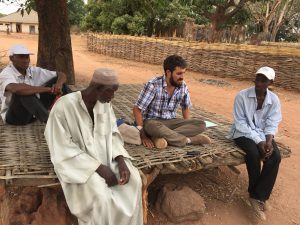
Year in Program: 7
Advisor: Walter Hawthorne
Committee: Nwando Achebe, David Robinson, Charles Keith, Liam Brockey
Areas of Study: African History (West Africa), World History, History of the Islamic World, Comparative Colonial History, Borderland Studies
Languages: Pulaar, French, Portuguese, Wolof
Educational Background: B.A., Dartmouth College, History and Geography, 2008.
Contact: glovskyd@msu.edu
My research focuses on migration as a catalyst for and response to social, religious, economic, and environmental change in Fulbe (Pulaar-speaking) communities in Senegal, The Gambia, Guinea-Bissau, and Guinea. It explores the changing nature of life in these regions during the late 19th and 20th century, from the pre-colonial to the post-colonial period. I defended my dissertation, “Belonging Beyond Boundaries: Constructing a Transnational Community in a West African Borderland”, with distinction, on September 30, 2019. It examines the movement of Fulbe people (and goods) starting in the late 19th century, analyzing how Fulbe communities have formed transnational communities outside of and alongside colonial and post-colonial states and borders. Despite colonial and post-colonial efforts to re-center these networks along national lines, borderland networks remained the primary focus within the region, as border regions became increasingly connected by migration and growing economic and religious connections. These communities demonstrate an alternative vision of territory and space than that of colonial and post-colonial states in the region.
I posit that border communities offer a unique lens for the wider study of colonial rule and post-colonial sovereignty throughout sub-Saharan Africa, and indicate to us the weaknesses and fissures of governance and territorial sovereignty of 20th and 21st century African states. I explore how Africans exploited colonial borders to create dynamic spaces of religious, social, and economic mobility and innovation. In my specific case, Fulbe of Senegal, The Gambia, Guinea-Bissau, and Guinea used their location to create new Islamic communities, to avoid taxation, military conscription, and forced labor, to move produce, livestock, and guns across borders, to marry across borders, and to search for better farm and pastureland. Through their movements, they created a territorial identity misaligned with the sovereign states of the region. I believe that borderlands like these offer a window into studying the spatial differential of colonial and post-colonial power, and studying historical change over areas where states have exercised minimal control. It also investigates the challenge of living between multiple states in a post-colonial era where citizenship became increasingly important.
More broadly, I am interested in the history of 19th and 20th Century West Africa, Senegal, Gambia, Guinea-Bissau, Guinea, Islam in Africa, African studies, borderland studies, the history of the Islamic World, comparative colonial history, digital humanities, the French, British, and Portuguese empires, Islam and colonial rule, world history, mobility and migration studies, historical geography, Fulbe history, culture and ethnicity, the kingdoms of Fuladu and Kaabu, and historical linguistics.
Before starting my PhD, I spent two years living in southern Senegal as a Peace Corps volunteer in the town of Dabo. My experience living and working in Pulaar communities throughout the area inspired me to return to academic life and explore the historical context of the area in which I had lived.
I also serve as a Pulaar language consultant on the NEH Ajami Research Project, selecting Pulaar manuscripts in Arabic script (‘Ajami) and digitizing, transliterating, and translating them into French and English for online and print publication.
My graduate studies, research, and writing have been assisted by an ACLS/Mellon Dissertation Completion Fellowship, the Fulbright-Hays Doctoral Dissertation Research Abroad (DDRA) Fellowship, the MSU College of Social Science, the Foreign Language and Areas Studies (FLAS) Program. I have presented research at conferences including the African Studies Association, the European Conference for African Studies, the American Association of Geographers, and the Association for Borderland Studies. I also won the Lusophone African Studies Organization paper prize for the 2018 African Studies Association annual meeting. In the 2018-19 academic year, I served as a Cultural Heritage Informatics Fellow.
Instructor of Record Experience:
SSC 499: Building Walls or Building Bridges? Borders and Migration in the Modern World
HST 201: Islam and the Colonial World (Instructor)
HST 324: History of Sport in America (Online Instructor)
Teaching Assistant/Assistant Instructor
IAH 205: Africa and the World
HST 150: World History Since 1500
HST 140: World History to 1500
IAH 202: Europe and the World: Encounters and Empires in an Age of Discovery
HST 489: Seminar in Digital History (Slavery and the Atlantic slave trade)
ISS 328: Culture of Soccer